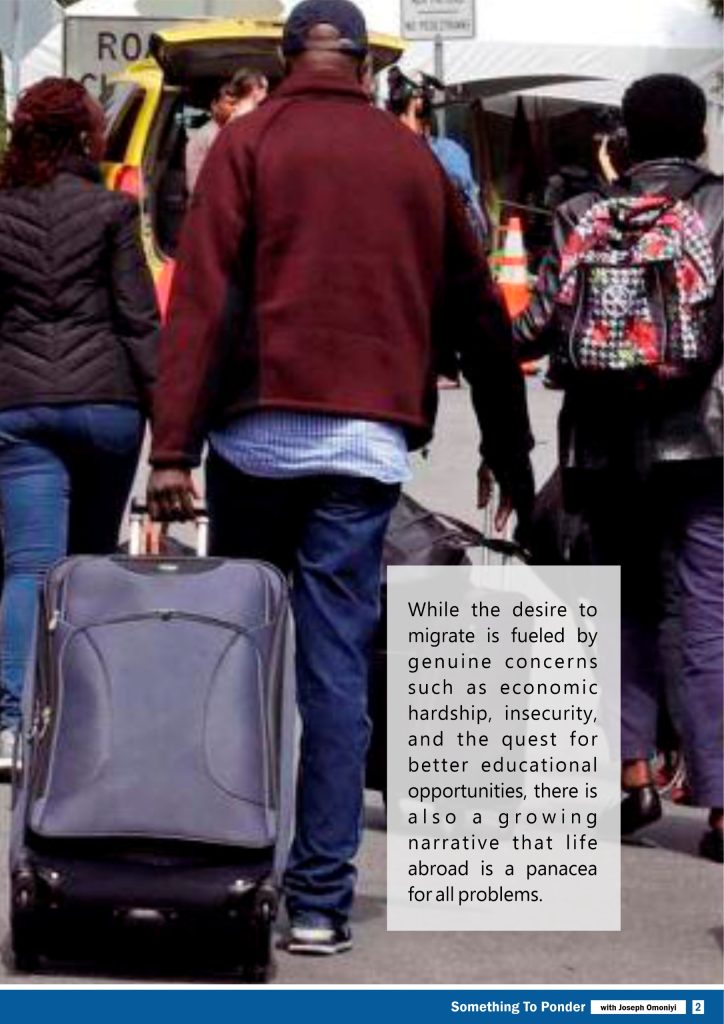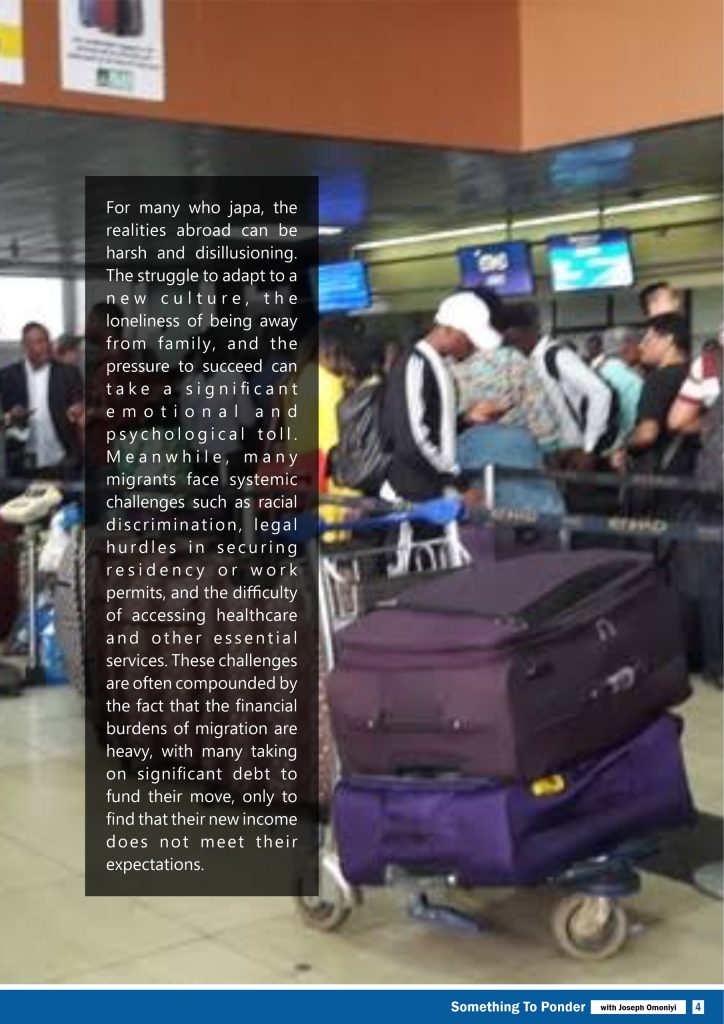It is a common saying that most times we celebrate what is not ours or that we have what we want but do not know how to use or manage it. “Nigerian Japa” is a popular culture in Nigeria and is credited to have originated from Nigeria for reasons of mostly, young Nigerians who have migrated to seek greener pasture ‘japing’ out of Nigeria. Migration has long been a part of the Nigerian story, with waves of citizens seeking opportunities abroad due to various push and pull factors. In recent years, however, this phenomenon of mass migration, “Japa Syndrome,” has been on the rise and has taken center stage. This syndrome of running swiftly out of a ‘dangerous situation,’ encapsulates the desperation with which many Nigerians seek to leave the country in pursuit of the ‘promised land’. The culture is largely driven by wrong perceptions and many myths of migration by many of the youths. Many of the myths are wrong while the few right myths are not properly analyzed and fully understood by the young people before they embark on their quest of desperation.
While the desire to migrate is fueled by genuine concerns such as economic hardship, insecurity, and the quest for better educational opportunities, there is also a growing narrative that life abroad is a panacea for all problems. This has led to a mass exodus of professionals, students, and families, often without a full understanding of the challenges that lie ahead. The impact of this migration trend on individuals, families, and Nigerian society at large is profound and multi-faceted. Many have lost lives and properties in the quest to get to this mythical promised land.

In a series of “Something To Ponder”, I seek to analyze and present these myths and truths in the quest to understand what young people hope to achieve in ‘japing’ and presenting the truth and realities and the opportunities of having what they are seeking out of Nigeria, with largely improved wellbeing and life satisfaction. I also aim to provide a comprehensive exploration and education of the “Japa Syndrome,” dispelling myths, presenting hard truths, and proposing sustainable solutions to address the root causes of this migration wave. I aim to create awareness, educate, and mobilize efforts to change the narratives surrounding migration in Nigeria and across Africa.
Historical Context of Migration Out of Nigeria
Migration has been an intrinsic part of Nigeria’s history, shaping its demographic, economic, and cultural landscape for centuries. From the pre-colonial era, when Nigerians moved across regions for trade, to the colonial period, which saw forced migrations due to the transatlantic slave trade, and later voluntary migrations for education and political asylum during and after the colonial era, the patterns of movement have been varied and complex. Each wave of migration has been driven by a combination of push factors—such as economic hardship, political instability, and insecurity—and pull factors, including the pursuit of better educational and economic opportunities abroad.
In the post-independence era, migration became increasingly tied to economic opportunities as Nigeria’s economy, largely dependent on oil, experienced fluctuations. The Structural Adjustment Program (SAP) of the 1980s, which was implemented to address economic crises, inadvertently led to severe economic hardship, unemployment, and inflation, pushing many Nigerians to seek greener pastures abroad. This period marked the beginning of the “brain drain” phenomenon, where skilled professionals, particularly in sectors like healthcare and education, left Nigeria in search of better working conditions and remuneration.
In recent years, the intensity and scale of migration, particularly among the youth, have escalated. This has been fueled by persistent economic challenges, rising insecurity, and a perceived lack of opportunities at home. The “Japa Syndrome,” as it is popularly known, reflects a sense of urgency and desperation among young Nigerians who feel that leaving the country is their only pathway to a better life. This exodus is not only draining Nigeria of its brightest talents but also creating significant societal challenges, including the fragmentation of families and communities, loss of cultural heritage, and a growing sense of disillusionment among those who remain.
Understanding the Japa Phenomenon

As noted earlier, this “Japa Syndrome” which has come to symbolize a mass exodus of Nigerians, particularly the youth, seeking to escape the perceived hopelessness and challenges at home for what they believe to be a better life abroad, has gained momentum in recent years, driven by a complex interplay of socio-economic factors, deep-seated insecurity, and the allure of an idealized life in foreign lands.
For many, the decision to “japa” is not just about seeking better economic opportunities but also about finding safety and a sense of stability in a world that feels increasingly uncertain. The realities on the ground, however, often differ starkly from the dreams that drive this migration. Many who leave are met with unexpected challenges, including systemic racism, underemployment, and the harsh realities of starting over in a foreign country.
Socio-Economic Factors:
At the heart of the Japa phenomenon is the economic struggle faced by many Nigerians. High unemployment rates, inflation, and the rising cost of living make it difficult for individuals, especially the youth, to envision a prosperous future within Nigeria. The lack of job opportunities, coupled with the inadequate remuneration for those employed, forces many to look abroad for a better standard of living. This economic desperation is exacerbated by stories of successful migrants who have seemingly “made it” abroad, further fueling the desire to leave.
Insecurity:
Nigeria’s ongoing issues with insecurity, from terrorism and banditry to kidnapping and communal clashes, have created an environment where safety cannot be taken for granted. The sense of physical danger, coupled with political instability, has led many to seek refuge in countries where they believe their lives and properties will be better protected. For those who live in regions particularly hard-hit by violence, the decision to leave is often seen as a necessary step for survival.
Lack of Opportunities:
The perception that opportunities for personal and professional growth are limited in Nigeria is a significant driver of the Japa Syndrome. With an educational system that often does not meet global standards and industries that are unable to absorb the growing number of graduates, many feel that their talents and ambitions cannot be fully realized at home. This has led to a brain drain, where some of Nigeria’s brightest minds leave in search of environments where they can thrive.
Glamorization of Life Abroad:
The image of life in foreign countries, particularly in Western nations, is often glamorized through social media, movies, and testimonials from those who have migrated. Social media platforms are flooded with images of success—luxury cars, beautiful homes, and prosperous lifestyles—that create unrealistic expectations among those considering migration. These portrayals rarely show the struggles and sacrifices that come with starting anew in a foreign land, including cultural isolation, the challenges of navigating immigration systems, and the difficulty of securing jobs that match one’s qualifications.
Unrealistic Expectations:
Fueled by stories of overnight success and the glamorized portrayal of life abroad, many Nigerians leave with unrealistic expectations of instant wealth and success. However, the reality is often one of underemployment or employment in low-paying, menial jobs that do not reflect their qualifications or experience. For example, doctors, engineers, and other professionals from Nigeria may find themselves working as cleaners, security guards, or dishwashers in their new countries. This disconnect between expectation and reality leads to frustration, depression, and in some cases, a desire to return home.
Social Media and Word of Mouth:
Social media has played a significant role in the spread of the Japa phenomenon. Platforms like Instagram, Twitter, and Facebook are filled with posts from Nigerians living abroad who share their seemingly successful lives, often omitting the struggles they face. Word of mouth also contributes, as returning migrants or those still abroad share selective stories of their successes, creating a skewed narrative that fuels the desire to migrate. This cycle perpetuates the belief that leaving Nigeria is the only viable option for success.

The Harsh Realities Abroad:
For many who japa, the realities abroad can be harsh and disillusioning. The struggle to adapt to a new culture, the loneliness of being away from family, and the pressure to succeed can take a significant emotional and psychological toll. Meanwhile, many migrants face systemic challenges such as racial discrimination, legal hurdles in securing residency or work permits, and the difficulty of accessing healthcare and other essential services. These challenges are often compounded by the fact that the financial burdens of migration are heavy, with many taking on significant debt to fund their move, only to find that their new income does not meet their expectations.
Read more: The Things-Fall-Apart-Okonkwo Debate: Can Idris Elba Roll Fufu?
The Independence Generation: Stories of Nigerians Born in 1960 – What it Felt Like
What Are You Doing to Survive in the Nigeria of Tomorrow?
Myths Surrounding the Japa Syndrome
The allure of migration, especially to Western countries, has given rise to several pervasive myths that fuel the Japa Syndrome. These myths create a distorted perception of life abroad, often leading to unrealistic expectations and, ultimately, disillusionment. Some of the most common beliefs include the assumption that relocating to another country guarantees instant wealth, stable employment, and an overall higher standard of living. However, the reality for many migrants is far more complex and challenging.
1. Myth: Life Abroad Guarantees Wealth and Financial Success
Reality: While some migrants do achieve financial success, it is often after years of hard work, sacrifices, and facing numerous obstacles. The idea that one can easily secure a high-paying job upon arrival is a misconception. Many migrants start with low-wage jobs, far below their qualifications, and struggle with the cost of living in their new country. For instance, a doctor in Nigeria might find themselves working as a dishwasher or in other menial jobs abroad due to differences in certification requirements or a saturated job market. The financial gains, if they come, are usually accompanied by high living expenses, taxes, and the burden of remittances to support family members back home.
2. Myth: Migration Ensures Job Security
Reality: The belief that securing employment abroad is easy and guarantees job security is misleading. Many migrants face underemployment, where they are unable to find work that matches their skills and qualifications. Others may struggle with job instability due to visa restrictions, layoffs, or economic downturns in their host countries. For example, many migrants have found themselves jobless or with reduced work hours during economic recessions or crises like the COVID-19 pandemic. Additionally, non-citizens often face big obstacles in accessing certain jobs or career advancements, leaving them stuck in entry-level positions.
3. Myth: A Higher Standard of Living is Guaranteed
Reality: The perception that living abroad automatically means enjoying a higher standard of living often ignores the realities of high living costs, cultural adjustment, and social isolation. Many migrants find that the cost of housing, healthcare, education, and other basic needs is significantly higher than expected, eroding the financial advantages they anticipated. Moreover, the social safety nets available to citizens are not always accessible to migrants, leading to difficulties in securing affordable housing, healthcare, or education for their children.
4. Myth: The West is a Land of Equal Opportunities
Reality: The ideal of equal opportunity in Western countries often clashes with the reality of systemic challenges such as discrimination, racial tensions, and xenophobia. Many migrants face discrimination in the job market, housing, and even in daily social interactions, which can hinder their ability to integrate and thrive. For instance, highly skilled professionals from Africa may find their qualifications undervalued or not recognized at all, leading to frustration and a sense of wasted potential. As a result, many have become, passive, redundant, and depressed. Racial profiling and social exclusion can also lead to mental health challenges, including depression and anxiety.

5. Myth: Life Abroad is Free from the Struggles Back Home
Reality: While migrants may escape certain struggles in their home country, they often encounter a new set of challenges and chaotic realities, abroad. These can include the stress of navigating immigration laws, the pressure to send remittances home, and the emotional toll of separation from loved ones. The assumption that life abroad is inherently easier can lead to shock and disappointment when migrants face the realities of their new environment. The stress of adapting to a new culture, learning a new language, and rebuilding social networks can be overwhelming, leading some to regret their decision to migrate.





